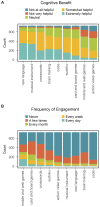Perceptions of Brain Training: Public Expectations of Cognitive Benefits From Popular Activities
- PMID: 32256323
- PMCID: PMC7092697
- DOI: 10.3389/fnhum.2020.00015
Perceptions of Brain Training: Public Expectations of Cognitive Benefits From Popular Activities
Abstract
Many popular activities are thought by the general public to improve cognitive function. Such expectations can influence how often people engage in these activities, as well as the scientific evaluation of their putative cognitive benefits, e.g., via placebo effects. Here, we gathered survey data about the public's perceptions of nine different activities commonly thought to be cognitively stimulating, including "brain-training" games. Information was collected about the degree to which participants thought each activity was beneficial for improving cognitive function and how often they engaged in each activity. The patterns of correlation between ratings reveal details about the perception of cognitive benefits and its relation to engagement. They suggest that participants varied with respect to an overarching perception of the entire set of activities, which were perceived also as divided into three clusters. Frequency of engagement and perceived cognitive benefits were positively correlated across participants for each activity considered individually. But, when the activities were compared, the magnitude of their perceived benefits was not a good predictor of their frequency of engagement (and vice versa). Though small, there were systematic demographic differences. Women were more optimistic than men about cognitive benefits. Individual participants differed in the range of their ratings of benefit across activities, and these ranges were greater for younger than older participants, suggesting that perceptions of benefit are more differentiated among the young. Besides contributing to a better understanding of public expectations of cognitive benefits, the findings of this study are relevant to the critical evaluation of such benefits. Our survey can be viewed as providing an interface between expectations held by the general public and the design of studies examining the efficacy of cognitive training. The type of information it provides could be used in the selection of activities performed by an active control group, so that control activities match the treatment intervention as closely as possible with respect to such expectations.
Keywords: active control group; cognitive training; engagement; expectation; growth mindset; neuroplasticity; placebo effect; video games.
Copyright © 2020 Ng, Schafer, Simone and Osman.
Figures





Similar articles
-
Enrichment Effects on Adult Cognitive Development: Can the Functional Capacity of Older Adults Be Preserved and Enhanced?Psychol Sci Public Interest. 2008 Oct;9(1):1-65. doi: 10.1111/j.1539-6053.2009.01034.x. Epub 2008 Oct 1. Psychol Sci Public Interest. 2008. PMID: 26162004
-
Controlling for Placebo Effects in Computerized Cognitive Training Studies With Healthy Older Adults From 2016-2018: Systematic Review.JMIR Serious Games. 2020 Jun 26;8(2):e14030. doi: 10.2196/14030. JMIR Serious Games. 2020. PMID: 32589159 Free PMC article. Review.
-
Behavioural modification interventions for medically unexplained symptoms in primary care: systematic reviews and economic evaluation.Health Technol Assess. 2020 Sep;24(46):1-490. doi: 10.3310/hta24460. Health Technol Assess. 2020. PMID: 32975190 Free PMC article.
-
The future of Cochrane Neonatal.Early Hum Dev. 2020 Nov;150:105191. doi: 10.1016/j.earlhumdev.2020.105191. Epub 2020 Sep 12. Early Hum Dev. 2020. PMID: 33036834
-
Do you believe in brain training? A questionnaire about expectations of computerised cognitive training.Behav Brain Res. 2015 Dec 15;295:64-70. doi: 10.1016/j.bbr.2015.01.002. Epub 2015 Jan 12. Behav Brain Res. 2015. PMID: 25591472
Cited by
-
Reverse effect of home-use binaural beats brain stimulation.Sci Rep. 2023 Jul 8;13(1):11079. doi: 10.1038/s41598-023-38313-4. Sci Rep. 2023. PMID: 37422545 Free PMC article.
-
Computerized Cognitive Training by Healthy Older and Younger Adults: Age Comparisons of Overall Efficacy and Selective Effects on Cognition.Front Neurol. 2021 Jan 8;11:564317. doi: 10.3389/fneur.2020.564317. eCollection 2020. Front Neurol. 2021. PMID: 33505344 Free PMC article.
-
Strengthening Mental Abilities with Relational Training (SMART) in multiple sclerosis (MS): study protocol for a feasibility randomised controlled trial.Pilot Feasibility Stud. 2022 Sep 3;8(1):195. doi: 10.1186/s40814-022-01152-7. Pilot Feasibility Stud. 2022. PMID: 36056385 Free PMC article.
-
The Effect of Video Game-Based Interventions on Performance and Cognitive Function in Older Adults: Bayesian Network Meta-analysis.JMIR Serious Games. 2021 Dec 30;9(4):e27058. doi: 10.2196/27058. JMIR Serious Games. 2021. PMID: 34967759 Free PMC article.
-
The Effect of Young People-Assisted, Individualized, Motion-Based Video Games on Physical, Cognitive, and Social Frailty Among Community-Dwelling Older Adults With Frailty: Randomized Controlled Trial.JMIR Serious Games. 2024 Nov 20;12:e57352. doi: 10.2196/57352. JMIR Serious Games. 2024. PMID: 39622701 Free PMC article.
References
-
- Benjamini Y., Hochberg Y. (1995). Controlling the false discovery rate: a practical and powerful approach to multiple testing. J. R. Stat. Soc. Series B 57, 289–300. 10.1111/j.2517-6161.1995.tb02031.x - DOI
-
- Brooker H., Wesnes K. A., Ballard C., Hampshire A., Aarsland D., Khan Z., et al. . (2018). An online investigation of the relationship between the frequency of word puzzle use and cognitive function in a large sample of older adults. Int. J. Geriatr. Psychiatry 34, 921–931. 10.1002/gps.5033 - DOI - PubMed
-
- Cognitive Training Data Response Letter (2014). Cognitive Training Data. Available online at: https://www.cognitivetrainingdata.org/the-controversy-does-brain-trainin.... Accessed January 26, 2020.
-
- Cortina J. M. (1993). What is coefficient alpha? An examination of theory and applications. J. Appl. Psychol. 78, 98–104. 10.1037/0021-9010.78.1.98 - DOI
LinkOut - more resources
Full Text Sources

